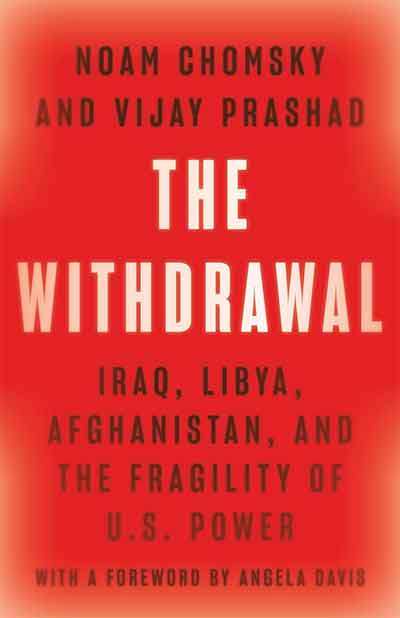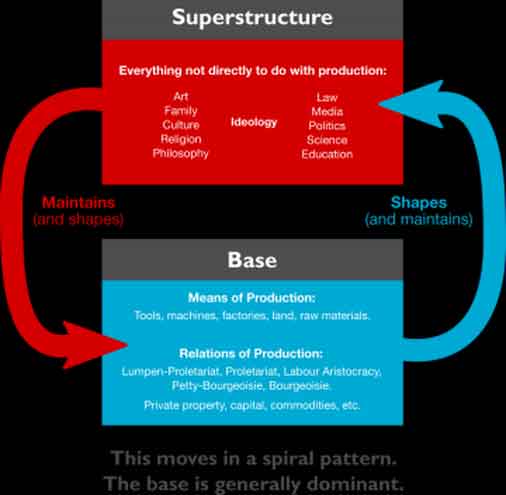Summary and Analysis
Last year in the summer of 2022 a wonderful friend named Debbie sent me a copy of Noam Chomsky and Vijay Prashad’s new book The Withdrawal. A year later I finally got the chance to sit down and read it (sorry it took me so long Debbie) and I was not disappointed as this text provides an excellent history of the major events and developments that have taken place within Western Capitalist imperialism throughout the last forty years or so. Those looking for a dense historical text will be disappointed as The Withdrawal is actually a transcribed conversation between Prashad and Chomsky, but this makes it a quick and easy read, perfect for beginners setting out to understand modern American policy and geopolitics.
 Going into this book I was curious to see how Chomsky and Prashad reconciled their views on existing socialist countries. Prashad is someone I’ve always admired for his ability to stand up for existing socialist countries and his refusal to parrot U.S. State Department talking points about countries like China. Chomsky on the other hand, has always provided brilliant critiques of the American empire, but has a tendency to sound like a mainstream liberal propagandist when the topic of the Soviet Union or Leninism comes up. However, it seems that Chomsky may be turning over a new leaf at the ripe age of 94 as attacks on China, Vietnam, and other existing socialist countries are notably absent from this book.
Going into this book I was curious to see how Chomsky and Prashad reconciled their views on existing socialist countries. Prashad is someone I’ve always admired for his ability to stand up for existing socialist countries and his refusal to parrot U.S. State Department talking points about countries like China. Chomsky on the other hand, has always provided brilliant critiques of the American empire, but has a tendency to sound like a mainstream liberal propagandist when the topic of the Soviet Union or Leninism comes up. However, it seems that Chomsky may be turning over a new leaf at the ripe age of 94 as attacks on China, Vietnam, and other existing socialist countries are notably absent from this book.
The Withdrawal provides an excellent summary of the American Empire going back thirty years at least, and it does an incredible job of placing the major geopolitical events of the past few decades within their proper historical context. By example Chomsky’s analysis of the 9/11 terror attacks doesn’t begin on September 11th 2001. Instead he details the millions of dollars that were funneled into Osama Bin Laden’s terrorist group known as the Mujahideen by the United States after the Soviet Union occupied Afghanistan in an attempt to stabilize the country. Through this historical analysis Chomsky reveals how the U.S. empire created the forces who carried out 9/11, then used 9/11 as justification to invade two countries, Afghanistan and Iraq, who had nothing to do with the attacks on September 11th. In fact, the U.S. waged war against Taliban and Iraqi Governments that were actually enemies of Osama Bin Laden’s Al-Qaeda group, an outgrowth of the Mujahideen.
Notably absent from Chomsky’s analysis is the claim so often made by Western academics that Soviet imperialism in Afghanistan was just as bad as American imperialism. Instead, Chomsky admits that most Afghans see the era of Soviet occupation as the most hopeful time in the country’s history. The Soviet soldiers fought bravely on behalf of the Marxist Democratic Government in power at the time against U.S. backed terrorist groups like the Mujahideen. They also helped the Government build factories, hospitals, infrastructure, and launch literacy campaigns teaching people to read even in the impoverished rural regions of the country. The U.S. on the other hand, dumped money and arms into Jihadist extremists who would throw acid on the faces of literacy workers and women who dared to walk outside without being covered head to toe. Thankfully, The Withdrawal avoids falling into the Western myth that tries to conflate Soviet and American imperialism as equal evils. And this may be due to the influence of Prashad, who has said in another book, Washington Bullets, that the CIA makes a concerted effort to conflate Soviet foreign policy with the worst acts of Western imperialism
Similarly absent from the book are any attacks against the People’s Republic of China (PRC), which Prashad and Chomsky accurately say is providing a counterweight to the long-held hegemony of the American empire. The Shanghai Cooperation Organization (SCO) and Belt and Road Initiative (BRICS) were created to counter American imperialism through cooperation and economic development, not to rival American imperialism through exploitation and debt trapping. The authors refuse to fall into the Western trope of dismissing everything that the PRC is doing as “authoritarian” or “imperialist” as so many academics tend to do. Instead, they take a measured and fact-based approach to looking at the foreign policy of the PRC, which ends up making socialist China look pretty dang good.
The book covers four core topics including Vietnam and Laos, 9/11 and Afghanistan, Iraq, and Libya. It will be an enlightening read for anybody who believed the mainstream media myths surrounding these major events. Chomsky brilliantly counterposes the facts of what actually happened in these four wars, to the mainstream media myths that were created to justify them. He also explains how the empire’s justification myths have morphed over time from the war against communism, used to justify the horrific bombing campaigns against Vietnam, Laos, and Cambodia, into the war on terror, used to justify the invasions of Afghanistan, Iraq, and Libya (as well as Syria although it’s not discussed thoroughly in The Withdrawal).
In totality the book provides a fantastic summary of American imperialism since World War II, and I would recommend that beginners in the field of geopolitics read this text in conjunction with Prashad’s Washington Bullets that I mentioned earlier (After you read Imperialism the Highest Stage of Capitalism by Lenin of course). The Withdrawal is an easy read and it is not cluttered with hundreds of academic sources, but it is filled with the knowledge of two academics who have spent most their lives studying the U.S. Empire.
Critique
My criticisms of The Withdrawal are contained to the explanations given by Prashad and Chomsky as to WHY the U.S. carries out the murderous and imperialistic policy that it does. For one, the authors use the analogy of the Godfather to explain U.S. policy, arguing that since World War II the U.S. has held unrivaled and unprecedented power on the global stage, allowing them to act like a mafia, breaking the knees of anybody who goes against their interests. I agree with this description of American power, and I find the Godfather to be a useful analogy for how the U.S. conducts foreign policy, constantly ignoring international law in order to violently protect their own economic interests.
Where I disagree with Chomsky and Prashad is when they say that American Policy is “rooted in a settler-colonial culture” or history. Make no mistake American policy is ROOTED in the mode of production, in the economic system of capitalism. America is not a uniquely evil country where people are born with some kind of innate drive to conquer foreign lands. Rather, we are a country of working people who are dominated by multinational corporations and finance capitalists that deceive the public in order to use them as pawns for advancing their global interests. It is not an attitude held by the American public that drives imperialist aggression, it is the incessant need for capital to expand, and the drive for surplus value inherent to the capitalist mode of production. The U.S. did not invade Iraq because Americans are a bunch of settler colonialists who wanted to seize a random country in the middle east. The U.S. invaded Iraq because the Koch brothers and other capitalists wanted Iraq’s oil. That is what American imperialism is rooted in, the need for constant expansion and increased profits which results from the capitalist mode of production, the basis for American society. And it is only through transforming this mode of production into a socialist one that we can bring a halt to American imperialism. Labeling the American working class as “settlers” will simply not achieve this goal.

Additionally, over 500 years have passed since European settlers first came to America. The U.S. is no longer a settler colonial project akin to the apartheid state of Israel, where every day native Palestinians are being forced off their land to make room for new Israeli settlement. It cannot be said that a settler colonial attitude has carried over hundreds of years later, and now acts as the motive force of American Imperialism in the year 2022 (the year the book was published).
From the Marxist perspective, settler colonial or American exceptionalist attitudes stem from the mode of production, and in turn help to condition the mode of production. By example the attitude of American exceptionalism has been produced and maintained by the ruling economic class of capitalists in order to get the American people on board with their regime change wars. American exceptionalism is rooted in the capitalist imperialist system, and in turn helps to keep that system churning. Again, to say that U.S. imperialism is rooted in an attitude of American exceptionalism or settler colonialism is to flip reality on its head.
Chomsky has never claimed to be a Marxist or dialectical materialist, and so I was not surprised to see him make this mistake. Prashad however, does come from a Marxist-Leninist tradition similar to myself, and I hope that he gets a chance to read this review and reconsiders his use of the word rooted when it comes to describing attitudes of American exceptionalism and settler colonialism.
Regardless, The Withdrawal is a fantastic text from two intellectuals who I deeply admire. It is filled with information about American Imperialism that has been systematically withheld from the American public by the American ruling class of capitalist, bankers, shareholders, and neoconservative/neoliberal politicians. I would recommend this text to any Americans who want to know what our government has been doing around the world in our name for the last 75 years or so.















































